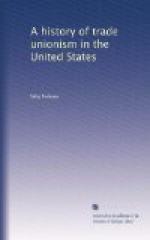Fate had decreed that these sections of a handful of immigrants should play for a time high-sounding parts in the world labor movement. When, at the World Congress of the International Workingmen’s Association at the Hague in 1872, the anarchist faction led by Bakunin had shown such strength that Marx and his socialist faction deemed it wise to move the General Council out of mischief’s way, they removed it to New York and entrusted its powers into the hands of the faithful German Marxians on this side of the Atlantic. This spelled the end of the Internationale as a world organization, but enormously increased the stakes of the factional fights within the handful of American Internationalists. The organization of the workers into trade unions, the Internationale’s first principle, was forgotten in the heat of intemperate struggles for empty honors and powerless offices. On top of that, with the panic of 1873 and the ensuing prolonged depression, the political drift asserted itself in socialism as it had in the labor movement in general and the movement, erstwhile devoted primarily to organization of trade unions, entered, urged on by the Lassalleans, into a series of political campaigns somewhat successful at first but soon succumbing to the inevitable fate of all amateurish attempts. Upon men of Strasser’s practical mental grasp these petty tempests in the melting pot could only produce an impression of sheer futility, and he turned to trade unionism as the only activity worth his while. Strasser had been elected president of the Cigar Makers’ International Union in 1877, in the midst of a great strike in New York against the tenement-house system.
The president of the local New York union of cigar makers was at the time Samuel Gompers, a young man of twenty-seven, who was born in England and came to America in 1862. In his endeavor to build up a model for the “new” unionism and in his almost uninterrupted headship of that movement for forty years is indicated Gompers’ truly representative character. Born of Dutch-Jewish parents in England in 1850, he typifies the cosmopolitan origins of American unionism. His early contact in the union of his trade with men like Strasser, upon whom the ideas of Marx and the International Workingmen’s Association had left an indelible stamp, and his thorough study of Marx gave him that grounding both in idealism and class consciousness which has produced many strong leaders of American unions and saved them from defection to other interests. Aggressive and uncompromising in a perpetual fight for the strongest possible position and power of trade unions, but always strong for collective agreements with the opposing employers, he displays the business tactics of organized labor. At the head of an organization which denies itself power over its constituent unions, he has brought and held together the most widely divergent and often antagonistic unions, while permitting each to develop and even to change its character to fit the changing industrial conditions.




